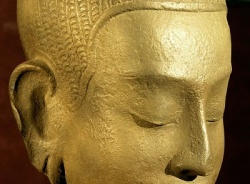Investigation
adapted from a talk by Gil Fronsdal, July 1st, 2002
Investigation is central to Vipassana practice, and can be considered an equal partner to Mindfulness. In fact, everything you need to learn on the path to liberation can be discovered through your own powers of investigation.
Investigation uses the mind’s capacity to observe what is happening in the present moment carefully and wisely. Investigation is a relaxed, alert Interest and should be done without clinging or aversion, without wanting any particular results. It is a natural faculty of the mind that comes to the fore when the mind is at ease.
This process of investigation does not entail discursive thought. In fact, investigation becomes more penetrating as the mind becomes quieter. Turning on a Light in a dark room and seeing the objects in it doesn’t require much thinking. Investigation can be understood as turning on the question, “What is this?”, and letting the Light of that question reveal the particulars of the present experience.
In my own practice, I often find that investigation is kept in Balance by Concentration. So when my thinking mind is active and easily distracted, I begin with Concentration on the Breath, to develop a stability and stillness of mind. I have learned that if I begin with investigation, the strong tendency to think turns the investigation into rumination about my experience, instead of direct observation. Also, the investigation can easily be biased when I am preoccupied with some thought or mood. Once the surface chatter of the mind quiets down and Concentration has stabilized the mind, investigation becomes more useful and reliable. One important area to investigate is our reactions. Our present moment experience is made up of two main components: what is happening and how we react to what is happening. Through spiritual maturity, we become wise to the latter. For example, if you are meditating and someone slams a door, you may become swept up in feelings of irritation and thoughts about the “thoughtless” person who disturbed your meditation. With investigation, the whole experience becomes an occasion for further Mindfulness practice. You might look carefully into the qualities of mind, thoughts and emotions that arise in response to the slamming. Then the door slamming is not a distraction but an opportunity for deeper understanding.
Bringing Interest and investigation to an experience can change our relationship to the experience because it changes the ecology of the mind, so to speak. Investigation brings a wholesome quality to the mind, which can initiate a significant shift in the mind when it is otherwise filled with unwholesome thoughts and reactions. Investigation can also “lubricate” the mind, that is, loosen it up when it is stuck or tight, obsessing about something or feeling constricted.
For example, I recently went through a bout of discouragement. So I investigated the feeling of discouragement in my Body-the tightness, heaviness, contraction and darkness. My thoughts were rapid; my mind felt tight and sticky. Investigation helped me to see the stickiness and attachment. The investigation itself was very accepting. I wasn’t trying to get rid of the feeling; I was just interested in discovering what my experience was. As I practiced, the investigation became stronger, which changed the Balance within my mind. I came to appreciate the investigation itself, which in turn brought in a little more lightness and ease. The stickiness of my thoughts started to dissolve-it was hard to remain fixated on them after seeing their ephemeral nature. Since my discouragement was grounded in the stories I was telling myself, as my obsession with the thoughts eased, the discouragement faded.
The Buddhist term for investigation is Dhamma vicaya. Vicaya has the connotation of making distinctions or sorting. The notion of sorting can be likened to the pre-modern way of sorting grain. After harvesting, farmers separated the chaff from the grain, the bran from the kernel, and the good grain from the rest. In a similar way, Dhamma vicaya refers to distinguishing between what is conducive to the development of our practice and what is not. We can use our intelligence to be discerning about our experience, to abandon the unwholesome and to cultivate the wholesome.
For example, if you see a violent movie, you may notice that it leaves traces in the mind that predispose it to be agitated. Or, if you spend time with angry people and participate in their Anger and frustration, you may find that your tendency toward being angry increases. Alternatively, investigation may help you notice activities and states of mind that are conducive to your inner health and well being.
By sorting through the unwholesome and the wholesome, we can choose to cultivate the wholesome and let go of the unwholesome. If you feel an inclination to be generous, for example, you can choose to water the seed of Generosity by following through on that inclination. You may be able to distinguish mean-spirited feelings and choose to let them go. With enough Mindfulness and investigation, you can even choose which thoughts to pursue and which to drop. You may be able to recognize when you are thinking along unwholesome lines and choose to think about something more useful.
We all have the capacity to be happy, loving and at peace. With investigation we can sort through our complex lives and distinguish what helps this capacity grow. If we place a high enough priority on these qualities, investigation will help us separate the chaff from the wheat.

